Rockbridge Academy Blog
Why Liberal Arts?
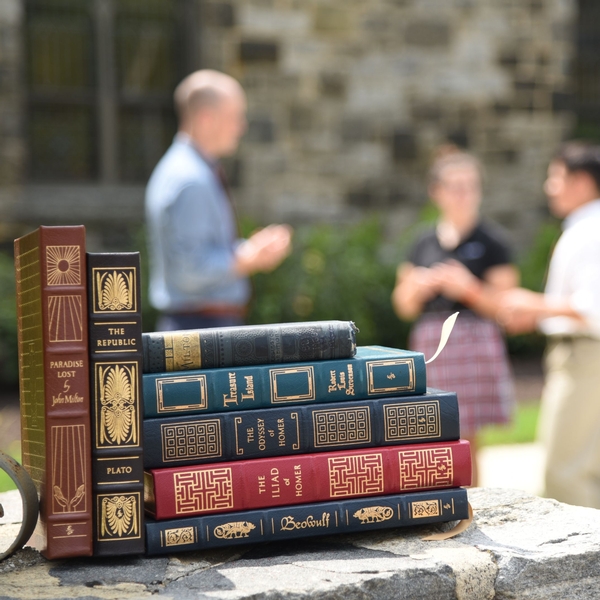
As the world grows increasingly more dependent on computers, AI, and STEM professions, the value of a well-rounded human has been forgotten by many. In STEM fields, college classes especially place the emphasis on cramming more math or science knowledge into the students’ brains, but they do not take the cultivation of the whole person into account. A liberal arts education, on the other hand, covers all fields: the humanities, social sciences, natural sciences, and arts. This form of learning equips the students with a diverse skillset. Historically, it has been composed of the trivium (grammar, dialectic, and rhetoric) and the quadrivium (geometry, arithmetic, astronomy, and music). They nurtured and cultivated the mind and spirit to understand and know. Despite many high schools and colleges discrediting the worth of a liberal arts education by not embracing them, it is still an important form of education for people in all professions. Even in my first semester in college, I’ve encountered students who are clearly brilliant, but lack the ability to interact with a historical text or carry on a deep discussion simply because they haven’t been taught that way. In any major, whether it be STEM or not, a well-rounded student needs a liberal arts education.
Even from a young age, a liberal arts education trains a student’s mind to question, interpret, and understand. By definition, it focuses on critical thinking, communication skills, and a well-rounded understanding of various fields. Once a student is equipped with tools of interpretation and critical thinking, it allows him to analyze and correctly judge the world around him more easily. If there’s a basis for how to think, it becomes easier to evaluate for ourselves what to think. It prepares a student for a life of learning and education. When applied correctly, these are skills that can be honed your entire life.
Not only does it train the mind how to think, but a liberal arts education also prepares a student for a STEM job better than a purely STEM education would. In the workforce, an employer does not just look at your GPA or your transcript, but also who you are. If you are a one-dimensional professional who only mainly understands math or science, you have a limited range of options in the workforce. However, if you can grasp the STEM concept, but also know how to communicate clearly and think on your feet, you are a much more valuable employee. Simply put, it opens a broader range of jobs. A typical science class at a non-liberal arts school gives you formulas, equations, and hands-on experience. The students greatly benefit from these classes, but schools often over emphasize the benefits of these classes, neglecting an important part of the education for what they believe is most important. Being well-spoken, articulate, and well-rounded are all benefits in a STEM field, and not necessarily something that a science class would teach.
Lastly, studying literature, rhetoric, and social sciences allows students to attain a holistic education. Every time you learn a new concept, it fits into the framework of knowledge that has already been created. This allows you to understand one subject in terms of another and make previously unseen connections, subsequently deepening your understanding of the world and God’s creation. A deeper understanding can in turn foster creativity and ingenuity in your chosen field, whether it be STEM or not. Further, if you feel like God is calling you to a different major or a different vocation than before, you don’t have to start from scratch because you already have a strong foundation and a broad education.
Liberal arts skills are basic, essential skills that everyone in every profession should learn, understand, and apply. Even in college, it is vital that you continue your liberal arts education. Learning about the humanities or how to express your thoughts concisely and clearly should not stop once you finish high school; rather, it becomes more important once you enter college or the workforce. In basic daily life, a well-rounded education allows individuals to meet the demands of a complex world, whether it be pitching a business idea, talking to a stranger, or solving a difficult engineering problem.
It is also important to recognize that a liberal arts education does not neglect the sciences. They are still an important part of the education system. Instead, it enhances the sciences. Math and science can provide us with scientific realities about the world, but they do not answer the metaphysical questions of why. Especially from a Christian perspective, studying philosophy, art, literature, and history allows us to ask and answer these questions. A liberal arts education provides an excellent, well-rounded framework that prepares you for life.
Julia Farr is a Rockbridge Academy Alumna, class of '25, studying Communications at Grove City College in Grove City, Pennsylvania.
Further Up and Further In—Library Stories of Life Together
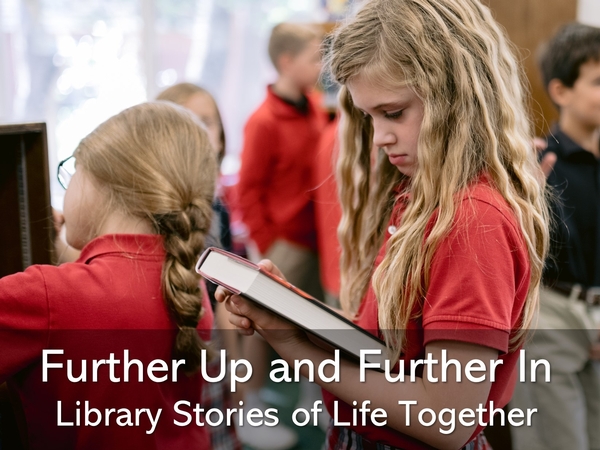
Boxes of books—moved and unpacked by many hands. That is how the present Rockbridge library began. Oh, make no mistake, Rockbridge always had a library, even before there was space for one. Great books have always been a defining thread in the culture of Rockbridge. It’s just that the books had to be placed on carts, in corners, on classroom shelves or tables, or wherever they could be safely tucked away and retrieved for use at suitable times. Now, however, over 10,000 books line the shelves of the school library, at the ready. The library still feels like a new attraction to many upper school students since the grand opening in September of 2022. Many grammar school students, on the other hand, will retain no memories of school without a library. As alumni wandered the halls before Christmas break during the Captain’s Cup, a few stepped into the library and one declared, “I am so jealous they have a library!” We don’t have books for the sake of having books, however. Stories bring us closer to one another and closer to our Savior. They bring us further “in.” As Aslan invited the children to come “further up and further in” in C.S. Lewis’ The Last Battle, come inside the library doors with me for a few moments to hear some stories.
As I step into the library each morning, flipping on the lights or entering to the sounds of beautiful music emanating from the instruments of rehearsing Rockbridge orchestra students, I am struck by the sight and smell of books—nostalgic memories flooding in from childhood days of library visits. These early-life visits being filled with wonder at what the pages hold from each book sitting on a shelf; imagining what journey each story will allow me to partake of or what tidbit of interesting information I can garner. Skip ahead a few years in memory to working in my university library…hoping during my shift that I’ll have some slow time in order to have a few minutes to comb through books in the special collections department or turn through the pages of a century-old newspaper…the corners of my mouth can’t help but turn up into a small smile as I pass through the Rockbridge library doors. After setting my things down, I retrieve the books that have been returned in the book drop, sort through books that have been donated, and collect the handwritten checkout slips, thrilled that the library has been used even during the “off hours.”
I think of the many anecdotes that have occurred over the past couple years in the library with students.
- I think of a kindergarten girl asking, “do you have any books about pink princesses?”
- Or, the 1st grade boy asking, “when are we going to get more books about snakes?”
- There are the instances of juniors or seniors telling me about their thesis topics and why they chose them.
- There’s the 9th grader’s eyes lighting up when they discover how many books we have about World War II!
- Then there’s the 3rd grader asking if we have any stories about dogs—she left the library with Because of Winn Dixie, only to come back a couple weeks later saying, “I love this book! As soon as I finish it, my mom said we could watch the movie together!”
- Then there’s a new upper school student perusing the library shelves and saying, “I love this series! I am definitely bringing in some books to donate!”
- Another instance is when a 2nd grader found a book on the shelf that had been consistently checked out by other students and exclaimed, “It’s finally mine!!!!”
- One of the sweetest things is seeing students in the hallway or after school saying, “Hi Mrs. St. Cyr! How’s the library?”
- There are dozens of other student stories, but I’ll end with a favorite. A junior kindergarten mom was in the building and expressed her thanks for our library. She said her daughter LOVES when her class visits the library each week. She told me she had been playing “library” at home with a table to check out books and had placed a bucket beside the table to serve as the “book return.” Oh, my heart.
I can’t help but share how amazing the Rockbridge faculty, staff, and community are as well. Through interactions and observations, I have experienced first-hand what it means to be part of a Christ-centered community.
- I think of Sam Ostransky bringing in theology classes and excitedly teaching them how to use Bible commentaries. Then he’ll stop by the library regularly to check out books for his small children at home—never neglecting to spend a moment at the library desk to give me an update on how my own children are doing in his classes.
- There’s Lysa Lytikainen or Caroline Master who spend a few minutes of work or a lunch break to get a moment by the sunshine streaming through the library windows. I absolutely love that Caroline is frequently pulling books off the shelves that she has looked up through the online library catalog prior to visiting.
- There are conversations with Andrew Menkis about Lewis or Tolkien.
- There’s Melanie Kaiss or Cheryl Mole bringing Mark Campbell into the library to check out books from his favorite Magic Treehouse series.
- There’s Bob Schingeck asking me to stage a joke with him at the circulation desk in order to elicit a giggle from a visiting class and brighten their day.
- There’s Matt Seufert, who provided me with the perfect scripture to use when I unexpectedly had to speak at a funeral.
- There’s Jacque Touhey, instrumental in the foundation of the library, checking in with wonderful ideas for helping the library thrive.
- There are Heidi Stevens and Laura Mathisen using their artistic and design gifts to discuss beautiful ways to make the library aesthetically pleasing to draw in students of all ages.
- There’s Therese Cooley using her art framing skills to repair a picture in the library that would have cost hundreds elsewhere.
- There are teachers who are at the ready and willing to help when I ask, “Can you bring your students to Story Time to share something they’ve learned?”
- When requesting recommendations for the book fair, there are book lists a mile long from Monica Godfrey or Matt Swanson.
- There’s a discussion with Monica Ault before the book fair about her recommendation of Anna Karenina and her love of the often difficult but profound Russian literature.
- There’s Kerry Anne Ward inviting me to a book club made up of mostly Rockbridge folk—where discussing Don Quixote or Kristin Lavransdatter with a savory treat in hand and a glass of sangria on the side just might be a little glimpse of heaven.
- There’s Stephen Unthank recommending publishers from which to request donations—and then receiving donations of many books from them!
- There’s Gretchen Geverdt continually bringing in donations because she makes it a point to go through books that the public library is disposing of to search for treasures.
- There’s Shannon Reich, to whom God must have given scheduling magic, who makes sure all the library events are perfectly placed on the calendar so as not to interfere with other events.
- There are beautiful moms who have used their time and gifts to make monthly story times special or design a gorgeous library bulletin board that evokes dozens of praises from passers-by.
- There are multiple parents who have stopped in the library and asked for our wish list so that they can be on the lookout for books to purchase and donate.
- There’s the added benefit of being in the library when classes bring in speakers and hearing talks about amazing topics from people like Chip Crane, Stephen Fix, Bryan Grube, or Matt Chwastyk.
- Being near the Beehive (library copy room)—may I please say that this active area is like no other workplace “water cooler” area I have ever witnessed? I’ve worked in several offices, and the places where people have the opportunity to converse are typically areas where people complain or gossip. The Beehive, however, is a place where there is uplifting conversation and offers of prayer and encouragement. It is a testament to how God is using this community.
- Jerry Keehner wheeling in carts of books from his personal library for students to use.
- An impromptu prayer time with Irma Cripe for a friend.
- A beautiful word of encouragement from Kim Ramirez or Chris Phillips. It is difficult for me to stop telling tales without writing a book!
Hopefully, these stories brought you “further up and further in” into life in the Rockbridge library. I think of how Aslan revealed himself to the Pevensie children through their experiences. They were ultimately drawn into the BEST story. At the end of The Last Battle, Lewis speaks of this story: “…the Great Story which no one on earth has read: which goes on forever: in which every chapter is better than the one before.” During a speech by Heidi Stevens at the library grand opening, she spoke of the time when the founding families of Rockbridge gathered together and what they envisioned. She said, “We longed for our children to recognize the great Story behind all good stories: the story of a King who is making all things right again and restoring his original pattern of what’s Beautiful, Good, and True.” May it be so.
Brenna St. Cyr has served in the Rockbridge library since its formation. She is currently pursuing her master's degree in Library Information Science and enjoys co-coordinating a food pantry at her church each week where she gets extensive community interaction. She has two children who attend Rockbridge, and she resides in Bowie, MD with her husband and children.
From our Library Grand Opening in September of 2022:
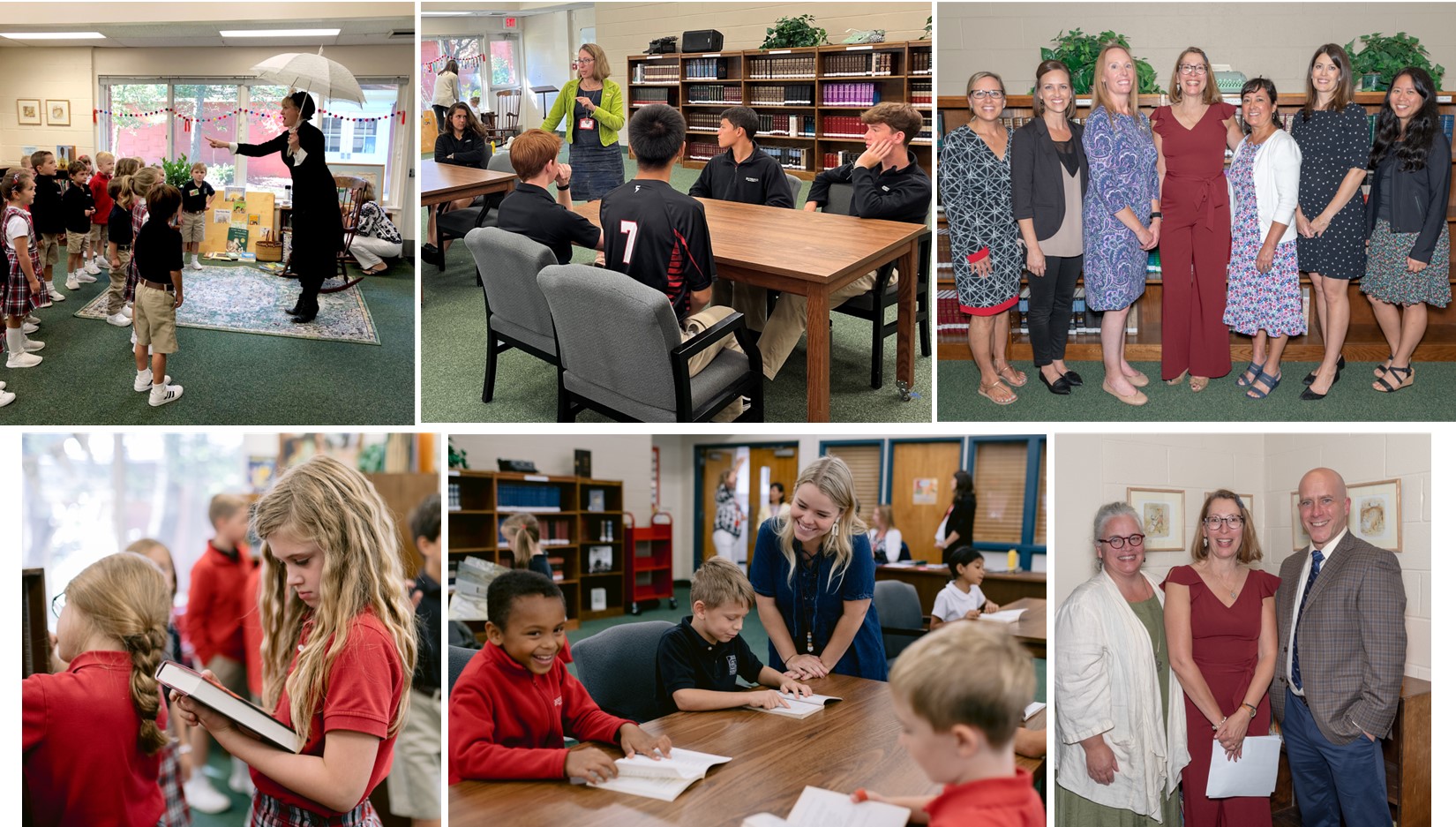
Why Do WE Read Hard Books?
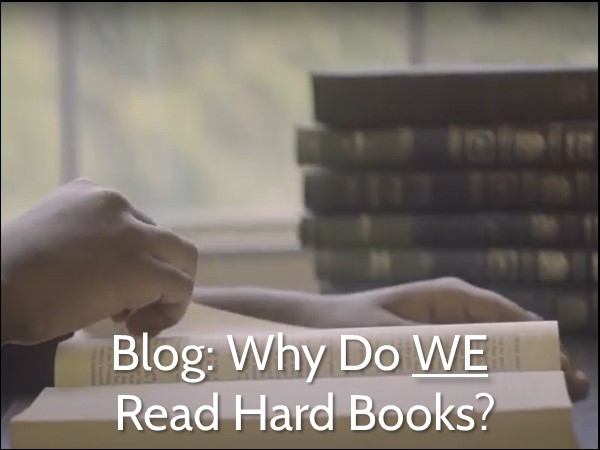
In a previous article, I argued that we should not really have a problem reading hard books. That, “it is hard” is not a fit excuse to avoid it; in fact, the very labor, by strengthening the mind, makes us more fit to read, absorb, and love harder and even greater books, most especially the Word of God.
I wanted to address one other word in the question, though: the word “we.”
Why do we read hard books?
Again, I, too, struggled with Milton, failing three times to get beyond book 2 of the epic. Yet, as I said before, I was largely responsible for pushing to re-introduce Paradise Lost into the freshman curriculum, and that losing the chance to read and re-read that book with Rockbridge students was the great regret of an otherwise wonderful load-lightening which preserved my sanity.
What I did not do was discuss how my attitude changed.
It has to do with “we”.
In the summer of 2008, I was blessed to be in my third year at St. John’s College. Each summer, we would choose a preceptorial—a set of readings and discussions that dove deeper into a particular work than the other courses had time to. Paradise Lost was one of the preceptorial options, and my intention was to avoid it, but my colleague Brad Finkbeiner persuaded me to take it with him.
Eight weeks later, I was hooked. What happened?
The classical methodology happened. We would read one book at a time, independently; our only requirement was that we come back to class equipped with a question we had about the text. (That part was not hard; I had lots of those.) Class began by presenting those questions, the best of which became apparent by how well they drove us into discussing the text, flipping back and forth from one page of the poem to another, comparing lines, trying to understand how a nuance, here, shaped the bigger picture. These were not debates—though sometimes if someone was demonstrably wrong a brief debate might flare up—so much as explorations: explorations of something that was great and good and, yes, hard.
Part of my mistake in reading Paradise Lost the first time was simply that I did not have the intellectual equipment to read it alone: I needed a guide, and I needed companions. Our tutor, Mr. May, was a true guide: more than a referee, much, much less than a lecturer. He fostered discussion that focused on Truth of the text and which demanded that we read more and more closely, discuss more and more carefully, listen to the other students around the table with a more gracious but still critical ear.
The “we” of dialectic happened.
It is that revolving pattern–the lone reader puzzling out the text at midnight (rocking my infant son to sleep), then coming together around a table at which we all sat puzzling about Milton—that pattern is the one that made the hard book not less hard, but less heavy.
Many hands make light work. In this case, many eyes made the work light—what had been dark, I could begin to see...
♦ the beautiful intricacies of Milton’s poetics, poetics that weighed each syllable and how it carried his point…
♦ the goodness of characters like the angel Abdiel, adamant, the lone rebel against a rebellious Satan, “Among the faithless, faithful only hee;/ Among innumerable false, unmoved…”
♦ the Truth as Milton—broken, blind, outcast—could see it: that an infinite God of infinite goodness must overwhelm the evil that seems, in the moment, to overwhelm us…
And that has been the delightful pattern of the last four years: four additional passes through Milton with Mrs. Ward and with these students, some of whom have brains that bend to literature with natural ease, some of whom struggle—but we grow and grow strong. The most powerful insights are not solely or even primarily from the so-called “A” students: they have come, consistently, from those students willing to lean in, to try to figure out what Milton means, what his words mean—not just passively sit and hope I will tell them. They are those with the courage to engage, to test something in conversation, and forgive others when we say dumb things… as I often have. And will let me cull out their mistakes, too, because it is the Truth we are after.
We need each other, more than ever. We need the student in the classroom, the teacher puzzling through this, because we want to know the truth, to live out the goodness, to revel in the beauty.
We need each other as we walk through God’s Word, a Word of more genius than any other—and of more difficulty…. And of more worth. We need the body to help us understand this Word, and then to live it—but not alone.
Ultimately, we need Him: the Father, the Son, and the Spirit to, as Milton says,
“…What in me is dark/
Illumine, what is low raise and support;
That to the highth of this great Argument
I may assert Eternal Providence,
and justify the ways of God to men.”
We need Him in order to take a simple Gospel woven throughout a hard book and share it with a dying, desperate world.
And that is why we—together—read hard books.
Why Do We Read Hard Books?
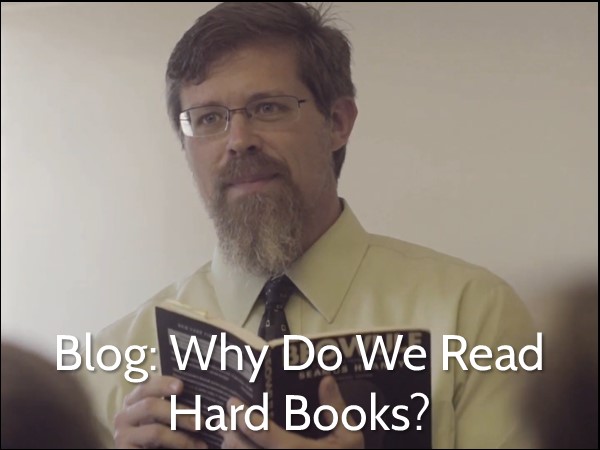
Paradise Lost. The first three times that I attempted to read this book on my own, I failed, never making it out of book 2. I was a literature teacher with several years of experience and at the beginning of my happy career at Rockbridge on my third failed attempt.
It’s a hard book. It’s a hard book, and Milton’s classical allusions, Latinate constructions, and theological asides were completely overwhelming to me, so I quit. I remember waiting at Annapolis Honda for my Civic’s oil change, trying to make sense of the thing. I finally abandoned the poem and comforted myself by asserting that “the Emperor has no clothes”: nothing that was this hard to slog through could be worth it.
And yet…
It is largely my fault that Paradise Lost is in our present 9th grade curriculum; I made my case to Ralph Janikowski and Mike McKenna in 2010, worked to maneuver Pilgrim’s Progress into the 8th grade curriculum to make room for Milton, and then, in the fall of 2011… My class load was reduced, I stopped teaching freshman literature, and I did not have the chance to teach the book for the next seven years. My deepest regret about that? Not having a chance to read Milton’s epic with Rockbridge students again.
And again.
And again.
Because it was a hard book, and it was worth it.
So let me address the question above: Why do we read hard books?
I freely acknowledge that, for their age and relative maturity, Paradise Lost is the hardest book in our curriculum for the students tasked with reading it… and then writing about it. I also acknowledge that, as I defend it, I am doing so from a place of sympathy: I know that it is hard, since I abandoned it several times myself.
Allow me first to challenge the assumption behind the question: “hard” is not the problem.
One of my favorite lines from A Tale of Two Cities describes Charles Darnay’s condition in London. The child of French aristocrats, he abandons their life and the wealth that came with it, moves to London under an assumed name, and is now making his way as a tutor. Dickens writes, “He had expected labour, and he had found it, and did it, and made the best of it. In this, his prosperity consisted.” As anyone who has read the book would know, the life of Darnay – with its labor, with its lower middle class trappings – is infinitely more rich than that of the aristocrats he left behind, at their ease but succumbing to their “leprosy of unreality.”
He chose a harder life not because it was hard, but because it was good.
And Paradise Lost, I will consistently argue, is good. Hard, but good.
In fact, looked at the right way, “hard” is just another way of acknowledging that the task involves cost: time, effort, the restructuring of the mind to grasp what is going on.
Thus, calling something “hard” is not so strongly negative as it first appears. In fact, looked at the right way, “hard” is just another way of acknowledging that the task involves cost: time, effort, the restructuring of the mind to grasp what is going on.
(An aside: what is the greatest benefit of math for any student? That it restructures the mind to think in a more organized, balanced, direct fashion. The constant query of, “When are we ever going to use this in real life?” thus entirely misses the point. In a very particular way, it does not matter if you ever use the quadratic equation again in your life; what you have gained is an ever-deepening ability to think clearly and appreciate something beautiful.)
Video games, which take us where we want to go anyway, are easy, and they alter the mind just as surely as potato chips alter my waistline. Healthy alteration of the mind is hard – as is the alteration of a pot-belly into abs of steel. The better abs, though, are not just useful for attracting a mate; they are actually a by-product of something that is just better for living: a healthy, fit body.
And struggling through math or Milton – leaning into the labor of it – can help to bring about that which is even more useful: a healthy, fit mind.
But people with abs of steel can be insufferably vain: this is true (I say this as a distinctly pot-bellied man). Is the goal of reading a hard book being able to look good because of my heightened mental acuity, just in time for next fall’s academic season? Of course not; the goal is to be able to get at the Truth, the goodness, the beauty that these works contain.
Greater minds than mine have defended the hard books of our curriculum for the goodness, beauty, and Truth found in them. I will add nothing to that here. I will confess that sometimes the complaint that “these books are too hard” arises because these books confront us with our own feebleness in the presence of something great (I write this as a confession of my own sins), and we have developed a society that tears down that which is great. Instead, we should see that, like a good, hard practice under the hot, August sun, the hard book prepares us for that which is even greater, for understanding and thinking more deeply, for going “further up and further in”.
Because the Bible, too, is a hard book, and we abandon the reading of it at our peril.
Instead, we should see that, like a good, hard practice under the hot, August sun, the hard book prepares us for that which is even greater, for understanding and thinking more deeply, for going “further up and further in”.
